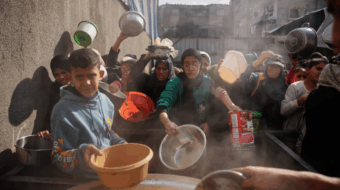CHICAGO – “There are really no great people. But there are ordinary people who courageously respond to great challenges,” said Carlos Arango, executive director of Casa Aztlan. Arango was reflecting on the life and legacy of Rudy Lozano at a June 7 gathering to mark the 20th anniversary of his assassination in 1983.
Family, friends and co-workers jammed the Rudy Lozano Public Library to hear an inspiring program of remarks, poetry and song. The library is located in Pilsen, the heart of Chicago’s Mexican American neighborhood, where Lozano worked as an organizer.
Lozano was remembered as an uncompromising and tireless leader of the Mexican American community who spearheaded efforts to build multi-racial coalitions, the labor movement and political independence, and fought for minority political representation and the rights of immigrant and undocumented workers. His death at the young age of 31 stunned the city.
Lozano’s family is still deeply involved in various community struggles. In opening the event, Lozano’s son Pepe said that youth urgently need role models like his father. “Many youth today are angry and frustrated by what is happening to them. That’s okay, but how are you going to challenge and use that anger? Don’t fear fear. Really stand up and fight for what you believe in,” said Pepe Lozano.
Rudy Lozano and his future wife Lupe became active while in high school, where they organized a movement for Latino studies and teachers. His activism continued at the University of Illinois at Chicago. He later became so involved in community issues that he abandoned his dream of becoming a doctor.
“Rudy had a vision of what the world should be like. If he were alive today he would be fighting for peace and solidarity,” said former State Senator Jesus Garcia. Garcia was one of several speakers who had worked closely with Lozano as youth coming up in the movements of the 1970s and early 1980s.
Garcia said many of the causes of which Lozano had been an early advocate were coming to fruition. He pointed out that Lozano, who was an organizer for the International Ladies Garment Workers Union (now UNITE!) at the time of his death, had fought for the labor movement to take up immigrant rights. Today the AFL-CIO embraces immigrant workers. But much still remains to be fought for, said Garcia.
Despite the hard work, Linda Coronado and Arango also spoke of the fun they had working with Lozano as youth. They described staying up late at night debating theory and politics and then getting up early in the freezing Chicago winter weather to organize demonstrations.
Those early discussions led to independent political action to break with the institutions of the Democratic Party machine and the process to elect the first Mexican American to the state legislature.
Many speakers referred to the role that Lozano played in building the historic multi-racial coalition resulting in the election of Harold Washington as the city’s first African American mayor in 1983. That legacy is alive and well. Today a majority of the 50 Chicago aldermen are African American, Mexican American and Puerto Rican.
In the recent municipal elections, several aldermanic candidates, including Latinos independent of the Daley Democratic Party machine, were elected. The 22nd Independent Political Organization (IPO) that Lozano, Garcia and others founded still exists and has a grown in influence. Its work resulted in the election of Alderman Ricardo Munoz.
Baldemar Velasquez, president of the Farm Labor Organizing Committee, said that he and Lozano crossed paths on many occasions while engaged in common struggles.
“When I first met Rudy, he looked in my eyes and I looked in his. We were kindred spirits. Here was a man of struggle,” remembered Velasquez. Lozano’s constant focus on the grassroots is relevant for today’s community and workplace struggles, he said.
“People like Rudy have kept me going all these years, helped inspire me and give me courage,” said Velasquez. “You don’t fear tomorrow when you have a brotherhood with people like Rudy.”
The Lozano family announced that a new collection was being organized at the Lozano Library dedicated to the history of the working-class movement and the Mexican American community, and especially the development of independent politics.
Que viva, Rudy!
John Bachtell can be reached at jbachtell@rednet.org









